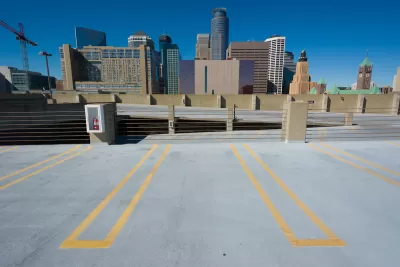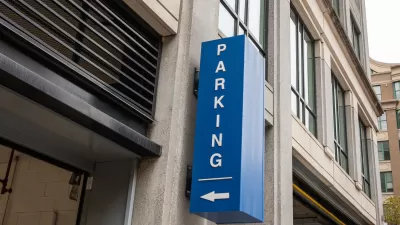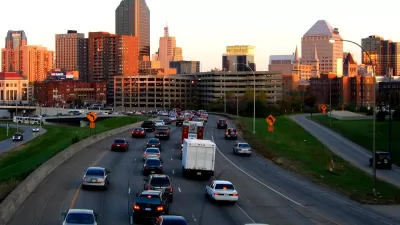Minneapolis and St. Paul both eliminated parking minimums, paving the way for less parking and more housing.

In an article originally published in Minnesota Reformer and reposted on Next City, Zak Yudhishthu outlines the Twin Cities’ success with parking reform.
Since St. Paul and Minneapolis voted to eliminate minimum parking requirements from their zoning codes, Minneapolis has seen less parking built and increased housing affordability. “The reduction in average parking spot per unit obscures an equally remarkable shift in the whole distribution of parking-unit ratios in Minneapolis. While some apartment developers have still opted to build relatively high quantities of parking, there’s been a rise in apartments with very little parking, or even none at all.”
The same type of data isn’t available for St. Paul, but anecdotal evidence shows that developers are taking advantage of the new rules to reduce the number of parking spots they build. In one case, a developer changed the design of a building from 91 housing units and 88 parking spots to 114 housing units and 82 parking spots. “More homes, less parking—and no need for a parking variance.”
While these results are far from radical, they indicate a positive trend that “reflect[s] a smart change that will improve the places that we live in,” Yudhishthu writes.
FULL STORY: Ending Minimum Parking Requirements Was A Policy Win For The Twin Cities

Alabama: Trump Terminates Settlements for Black Communities Harmed By Raw Sewage
Trump deemed the landmark civil rights agreement “illegal DEI and environmental justice policy.”

Planetizen Federal Action Tracker
A weekly monitor of how Trump’s orders and actions are impacting planners and planning in America.

The 120 Year Old Tiny Home Villages That Sheltered San Francisco’s Earthquake Refugees
More than a century ago, San Francisco mobilized to house thousands of residents displaced by the 1906 earthquake. Could their strategy offer a model for the present?

Ken Jennings Launches Transit Web Series
The Jeopardy champ wants you to ride public transit.

BLM To Rescind Public Lands Rule
The change will downgrade conservation, once again putting federal land at risk for mining and other extractive uses.

Indy Neighborhood Group Builds Temporary Multi-Use Path
Community members, aided in part by funding from the city, repurposed a vehicle lane to create a protected bike and pedestrian path for the summer season.
Urban Design for Planners 1: Software Tools
This six-course series explores essential urban design concepts using open source software and equips planners with the tools they need to participate fully in the urban design process.
Planning for Universal Design
Learn the tools for implementing Universal Design in planning regulations.
Clanton & Associates, Inc.
Jessamine County Fiscal Court
Institute for Housing and Urban Development Studies (IHS)
City of Grandview
Harvard GSD Executive Education
Toledo-Lucas County Plan Commissions
Salt Lake City
NYU Wagner Graduate School of Public Service





























